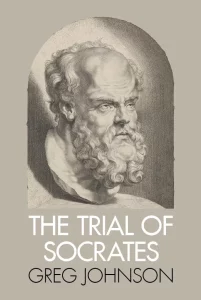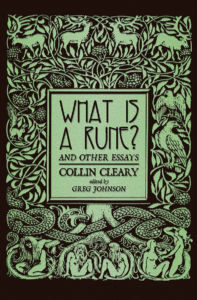Notes on Plato’s Gorgias, Part 5: Rhetoric as Quackery
2,883 words
Part 5 of 10 (Part 1 here, Part 2 here, Part 3 here, Part 4 here)
Setting the Stage
Socrates’ conversation with Polus deals with three important philosophical issues.
First, Socrates explains the true nature of rhetoric, which requires that he contrast it with philosophy. This discussion requires several important distinctions: soul vs. body, art vs. quackery, edification vs. corruption, and friendship vs. flattery.
Second, Socrates explains the true nature of freedom. Freedom is not doing what you think you want. It is doing what you really want, which is to lead a good life. This generates a powerful argument against liberalism and for paternalism.
Third, Socrates makes a very powerful argument that, if forced to choose one or the other, it is better to suffer wrong than to do it. This is connected to a theory of punishment as rehabilitative, as basically medicine for the soul.
We should also be attentive to two themes running through this discussion, and the whole dialogue.
The first theme is power politics.
Gorgias claims that rhetoric secures the greatest of human goods: freedom for oneself and power over others. Rhetoric is the master art that encompasses and subordinates all other arts and the whole of society. Thus rhetoric is the art of taking and keeping comprehensive political power. As we shall see, Polus argues that orators and tyrants have the same power, the greatest power, which allows them to kill or exile their enemies and expropriate their property. When we get to Callicles, he basically argues that might makes right and defends tyranny as the best life.
So, all of Socrates’ interlocutors believe in power politics to one extent or another. Gorgias believes that power needs to be justly governed, but Polus and Callicles chafe against such structures. Thus throughout the Gorgias, Socrates is trying to argue the case of right against might. This is the true polemos of the dialogue. What separates Socrates from the sophists is his conviction that morality must rule over political power.
The second theme is shame.
Polus is a rude and disagreeable man. He interrupts conversations with his teacher Gorgias twice, and the second time he manages to hijack the conversation and hold the floor longer than Gorgias did. He begins by asking Socrates if he is really sincere about rhetoric. Then he accuses Gorgias of assenting to the idea that students of rhetoric must know justice merely out of shame: essentially, out of fear of his audience.
Polus also accuses Socrates of bad manners, in exploiting Gorgias’ natural reluctance to admit that, no, it is not his responsibility to teach his students about justice. Polus has a cynical, “We’re all men of the world here” attitude. Asking Gorgias before an audience if he cares about justice is as boorish as asking him if he’s ever been drunk. Everybody has been drunk, thus asking about it in public is to demand that everyone act the hypocrite out of politeness. Similarly, everyone cuts corners about morals, so it is just bad manners to ask everyone to pay lip service to justice. But Polus is proud to be shameless enough to declare the truth: rhetoric is a value-neutral art.
Was Gorgias genuinely and sincerely concerned with justice, or did he merely want to seem that way, because that’s the socially appropriate and politically prudent thing to do? As we will see, for Socrates, all men are always-already concerned with justice, no matter what their motives for speaking about it. Polus, however, immediately assumes that both Socrates and Gorgias are acting in bad faith. That’s a very cynical assumption, and gentlemen aren’t cynical.
But Polus isn’t entirely cynical. He has some sense of right and wrong. Even accusing people of arguing in bad faith assumes a standard of right conduct and a willingness to uphold it. So does accusing Socrates of bad manners.
It is noteworthy that Socrates refutes Polis based on the latter’s belief that certain actions are “fine” or “noble” (kalon) and others are “shameful” (aischron). Socrates peppers his conversation with Polus with these terms. The Greek concept of the gentleman is the kalos k’agathos, literally the noble and good man. A susceptibility to such concepts means there’s something slightly gentlemanly about Polus as well, which allows Socrates to defeat him in the end.

You can buy Greg Johnson’s The Trial of Socrates here.
Then Callicles jumps in. Callicles realizes that to defend rhetoric and tyranny, one must overthrow justice and argue that might makes right. But, as we will see, Socrates discovers that Callicles’ concept of might is not mere physical force or mere force of numbers. It is an elitist notion of what is fine or noble which makes even Callicles susceptible to feelings of shame.
Both Polus and Callicles interpret shame to be merely a “social” feeling. Shame is how society enforces conformity to mutable human conventions. Socrates, however, believes that shame is natural. If all men by nature are pursuing the good life, it stands to reason that nature would equip us with sentiments that would draw us to toward the good and away from evil.
Socrates receives Polus’ interruption and outburst in good humor, responding with the words “O finest [kalliste] Polus,” working in the superlative form of kalon at the very start. Socrates notes that Polus is younger than himself and Gorgias, but he generously allows that this may not be mere bad manners on Polus’ part. This may be a genuine opportunity for youth to school maturity. Socrates invites Polus to expose his errors so that he may correct himself.
But on one condition: that he keep his answers brief, meaning: no speechifying. Socrates also insisted on this with Gorgias. Why? To keep control. In a dialogue, he can intervene at every step in the argument to guide it to his desired conclusions. In a speech, he won’t be able to get a word in edgewise. Instead, he and his audience will be drowned in superficially impressive but ultimately empty and stultifying clichés.
Polus bristles at this condition, but Socrates tartly remarks that if Polus wishes to avail himself of Athenian freedom of speech at too great a length, Socrates will invoke his Athenian freedom to ignore him. This points to a major weakness of all forms of argument: Words alone can’t force people to listen. Moreover, if Polus claims to know what Gorgias knows, surely he can answer questions just as well as his teacher. To sweeten the deal, Socrates invites Polus to ask the first question.
Art vs. Quackery
Polus asks Socrates, “What is rhetoric?” Socrates asks if he means ‘What sort of art [techne] is rhetoric?’ Polus says yes. Socrates then claims that rhetoric is not an art at all. Citing Polus’ own book, Socrates thinks that rhetoric is a “knack.” The Greek word is empeiria, from which we get the word “empirical.” An empeiria is a skill based on experience.
Every art has a practical dimension, because arts change reality. No art is pure theory. Even arts that consist entirely of speeches require practice. To learn rhetoric, you can’t just talk about speeches, you’ve got to make them.
But a true art is not just practice. The true master of an art has taken a step back from the practices, reflected on them, and articulated some general principles: rules of thumb as well as explanatory theories. These are logoi, which you can translate as “verbal accounts.” A true art can give a rational account of itself. A true techne is thus empeiria plus logoi.
Because true artists have logoi, they are good at teaching their arts to others. Those who have mere knacks tend to be poor teachers. The best they can do is to urge others to imitate them and practice, practice, practice.
The main reason why philosophy is not, ultimately, an art for Socrates is that philosophy can’t be taught. That’s not because philosophy lacks logoi. Philosophy isn’t a knack. Philosophy isn’t teachable because we already know it. Therefore, philosophical education for Plato is primarily a matter of articulating what we already know.
In eighteenth-century English, the word “empiric” referred to a quack doctor, a charlatan, a bumbler. Quacks practiced medicine based solely on knacks: experience refined merely by trial and error. Thus Socrates is drawing a contrast between true arts and quackery, and rhetoricians are quacks.
Socrates’ contrasts are best summed up in a table, generated by two distinctions: the body vs. the soul and true well-being versus the mere appearance of well-being, which is feeling good. Specifically, Socrates is talking about caring for the body and caring for the soul. Such care can produce true and false forms of well-being for both body and soul.
| Well-Being = real health
Produced by: work (self-discipline, friendship, edification, education, building up)
Aided by: True art (techne) = (knack + logos)
Guided by: the good | Merely Feeling/Looking Good = apparent health
Produced by: flattery (kolakeia), pandering, stooping down, self-indulgence, corruption Aided by: knack (empeiria = skill without logos) + guesswork, schmoozing, puffery, bravado
Guided by: The pleasurable | |
| Care of the Body | Health Production & Restoration (produces physical well-being) 1. gymnastics (health production = diet, exercise, healthy living) 2. medicine (restores good health, purges bad health) | Counterfeit Health (produces the appearance of physical well-being) 1. cosmetics (creates the appearance of good health) 2. confectionary (creates the feeling of good health while creating bad health) |
| Care of the Soul | Politics (produces spiritual well-being) 1. legislation (builds up spiritual health) 2. justice (punishment, purges spiritual sickness) | Counterfeit Politics (produces spiritual corruption) 1. sophistry (in legislatures, produces unjust legislation) 2. oratory (in law courts, produces unjust punishments) |
Why is well-being different from merely feeling good? Because sometimes pains are good for us, and pleasures are bad. It is always easier to take children to the candy store than the dentist, because candy tastes good, and dentistry feels bad. But dentistry is good for our physical well-being, and candy is bad.
Let’s begin with the first column, well-being, both of body and soul. Well-being basically means genuine physical and mental health. For Socrates, we all naturally seek well-being. But we don’t always achieve it, for several reasons. First, well-being requires external conditions that aren’t always available. Second, well-being requires efforts that don’t always work. Third, well-being requires knowledge that isn’t always available. Fourth, well-being has counterfeits that are often highly tempting, even addictive.
Counterfeit well-being brings us to the second column. When you have genuine well-being, you feel good and look good. Well-being is the cause. Feeling and looking good are the effects. Thus it is natural to try to reverse the causal relationship: by looking and feeling good, we hope to achieve well-being. But it doesn’t always work that way.
First, any good thing in excess becomes bad. Second, some pleasures are so destructive that they can’t be enjoyed even in moderation. For instance, highly addictive drugs and behaviors destroy your ability to moderate them. Third, merely looking good can secure some of the external rewards of well-being, but this simply makes one less likely to achieve actual well-being.
Well-being is produced by work, specifically edifying work — work that builds up both body and soul. These include a good diet, exercise, and education, both of character and mind. All of these require self-discipline, principally the virtue of moderation, as well as a willingness to defer gratification to the future and a refusal to settle for counterfeits and shortcuts. Edification is impossible, however, if one feels one is “good enough.” Thus to raise people up, we need to put them down, i.e., to purge them of smugness, complacency, and laziness. This often requires some tough talk, which is why friendship is one of the things that produces well-being. True friends tell you what you need to know to live well, regardless of whether you want to hear it. Socrates also adds that producing well-being is aided by genuine arts. But to be successful, the whole process must be guided by an understanding of the good, namely the well-being we are all pursuing.

You can buy Collin Cleary’s What is a Rune? here
Merely apparent well-being is appealing, because it requires less work, less self-discipline, less delayed gratification, and less discernment. The purveyors of fake well-being don’t try to break down your laziness and complacency to build you up. Instead, they flatter you by saying you are good enough the way you are.
Socrates uses the Greek word kolakeia here, which can be translated as “flattery.” A better translation might be “pandering.” Pandering caters to, exploits, and confirms people in ignorance and vice. It is the opposite of edification. Pandering offers shortcuts and easy solutions.
Pandering is the realm of quacks who have some genuine skills but paper over their weak points with bold guesswork and fraudulent fast talk. Because quacks produce apparent rather than real well-being, they are highly attuned to people’s psychology and opinions, which they manipulate. They are consummate puffers, flatterers, and schmoozers. But of course they will resort to bullying and gaslighting when cornered.
Just as edification is guided by the good, corruption is guided by a fake good: pleasure.
Let’s look more carefully at the care and corruption of the body.
The care of the body involves both the production and the restoration of health. Socrates calls the production of health “gymnastic,” which refers broadly to any health regimen, principally exercise and diet. Socrates calls the restoration of health “medicine.”
The fake care of the body also has two modes: production and restoration. Socrates calls the production of the appearance of health “cosmetics,” which would include every means of faking youth, health, and beauty: makeup, hair coloring, sun tanning, even plastic surgery.
Socrates calls the fake restoration of health/removal of illness “confectionery,” which basically means anything that makes you feel good while ruining your health, whether it be food, drink, or drugs. On this account, Dr. Feelgood prescribing uppers and downers would be a confectioner as well.
Now let’s turn to the care and corruption of the soul. In the Gorgias, Socrates assigns the care of the soul not to philosophy, but to politics. Statecraft is soulcraft. As with the care of the body, the care of the soul has two modes: the production of health and the removal of disease.
Socrates calls the production of spiritual health “legislation,” literally laying down the law. The word for “law” here is nomos, which has a wider meaning than mere statutory law. It encompasses all social norms. Laying down the law basically means upholding standards and creating institutions and practices that morally and intellectually edify the people. Socrates calls the removal of spiritual sickness “justice.” As he explains later to Polus, Socrates sees punishment as spiritual medicine, as opposed to retribution or deterrence.
The fake care of the soul is counterfeit politics. It, too, has two modes: imparting fake health and removing the appearance of illness. Socrates calls counterfeit legislation “sophistry,” which is somewhat confusing, because it does not necessarily require the services of the sophists. I am sure that Socrates is primarily thinking of the role of sophistry in the rise to power of men who look good but act bad. But if real legislation produces spiritual health for the city as a whole, then sophistry as fake legislation would produce fake spiritual health for the city as whole. Some examples of this would be economic prosperity, military power, and impressive buildings and monuments — basically, everything that characterized Athens at its peak.
Socrates calls the false version of punishment “oratory,” which is again confusing, since it need not involve the use of oratory. The primary example Socrates is thinking of is the use of oratory in the courts to produce unjust outcomes. Think, for example, of Gorgias’ show speech, the Encomium of Helen, which argues that Helen of Troy is not responsible for her actions. The same arguments, of course, were used to exculpate any criminal. Fake justice can include false and ineffective forms of punishment. Furthermore, oratory could encompass the whole realm of propaganda, including the art of “spin-doctoring.” Moreover, the flip side of false exculpation is also false blame, which is a staple of political corruption as well.
Once we lay out this scheme, we can generate a set of wonderful analogies:
- Cosmetics is to gymnastics as confectionery is to medicine.
- Sophistry is to legislation as oratory is to justice.
- Confectionery is to medicine as oratory is to justice.
- Cosmetics is to gymnastics as sophistry is to legislation.
We can also generate some pithy metaphors:
- Legislation is the gymnastics of the soul.
- Gymnastics is the legislation of the body.
- Medicine is the justice of the body.
- Justice is the medicine of the soul.
- Confectionery is the oratory of the body.
- Oratory is the confectionery of the soul.
- Cosmetics is the sophistry of the body.
- Sophistry is the cosmetics of the soul.
This is a very long answer to the short question, “What kind of art is rhetoric?” The answer is: rhetoric is not the master art, as Gorgias claimed. The true master art is politics, which, because it encompasses all human affairs and looks to the good, is identical with philosophy. Furthermore, rhetoric isn’t even an art at all. It is quackery. It is, moreover, quackery of the most dangerous kind, because it corrupts all of society from the top down, promoting every false standard of health and impeding every attempt to remove sickness and vice, thereby ruining the souls of all the citizens.




